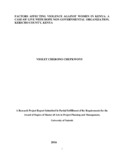| dc.description.abstract | Gender Based Violence also referred to as Violence against Women (VAW) and girls continues to be a global epidemic that kills tortures and maims physically, psychologically, sexually and economically. It is one of the most pervasive of human rights denying women and girls‟ security, equality, self-worth and their right to enjoy fundamental freedoms. This study focuses specifically on Violence against women initiated by an intimate partner, the most prevalent yet relatively hidden and ignored form of violence against women and girls. The study thus sought to examine the factors affecting violence against women in Kenya. The study was conducted at the Live with Hope NGO in Ainamoi constituency, Kericho County and the research was guided by the following objectives; to assess how education interventions affect violence against women in Kenya, to establish how rehabilitation center programs affect violence against women in Kenya, to assess how group interventions affect violence against women in Kenya and to determine how free legal counsel affect violence against women in Kenya. The study adopted a descriptive survey design to carry out the research. The target population for the study was sourced from Live with Hope NGO staff and domestic violence victims, whom the organization provided. The respondents totaled 150 individuals of whom 107 successfully filled the questionnaires and were interviewed as the census sample since the population was small and manageable. Data collected was obtained from secondary and primary sources. In relation to that, the instruments used in the collection of data comprised of interviews and questionnaires for primary data and scrutiny of existing records for the secondary data. The data obtained was analyzed through the application of descriptive statistics tools and SPSS software. The outcomes of the study were indicated in percentages and descriptive statistics. Information obtained from the study is beneficial to the Government of Kenya (GoK) through planning and rolling out of programs to aid in the reduction of domestic violence, universities and consultancy firms. From the findings, the researcher concluded that rehabilitation programs had moderate effect on violence against women. Victims of domestic violence are economically empowered and the programs provide temporary shelters for victims. The services provided however were not all free according to the respondents. Education interventions such as the social gatherings to create awareness and media provides information on domestic violence to the public for the victims. Members of the society still stigmatizes gender violence victims. Group interventions such as couple counseling and anger management provide short term solutions while free legal counsel helped victims get out of abusive marriages faster. Free legal services to get government benefits for domestic violence survivors was hard to find. This could be due to the fact that lawyers who provide free legal counsel are not many | en_US |



